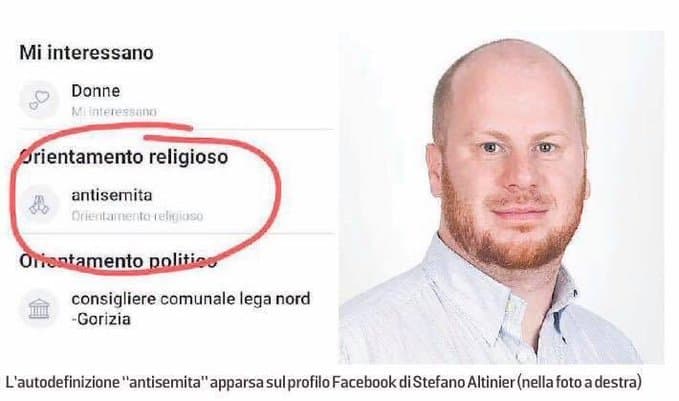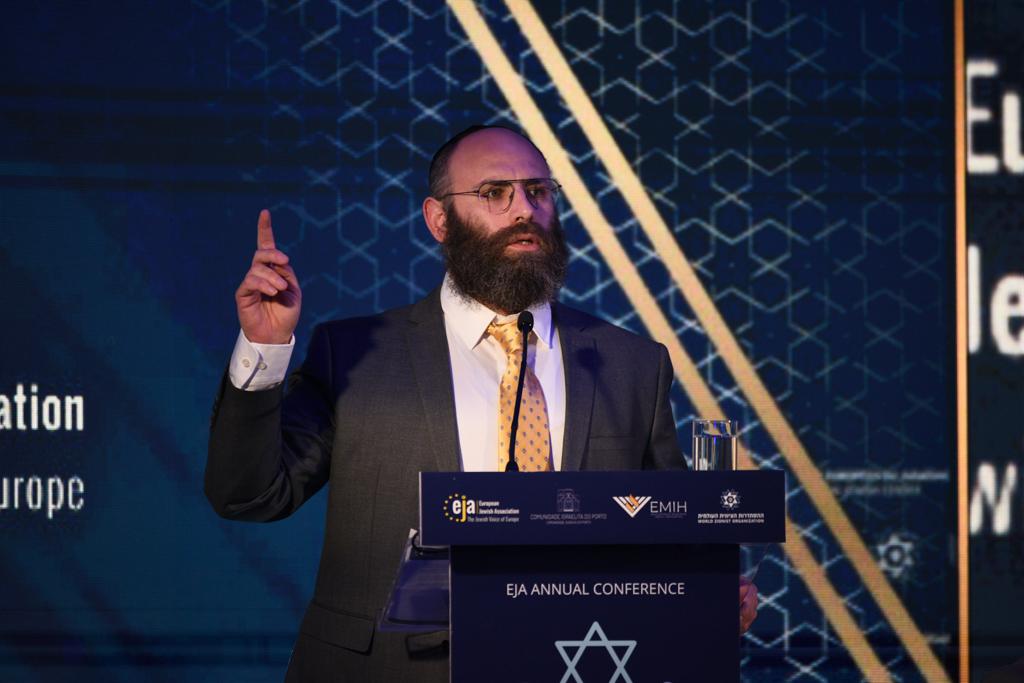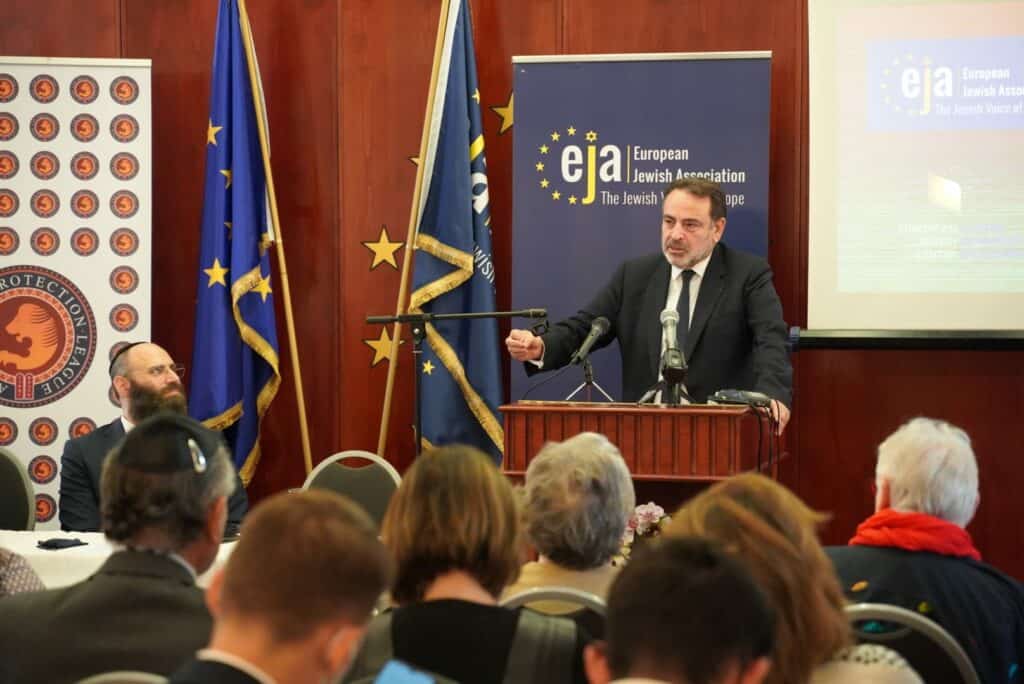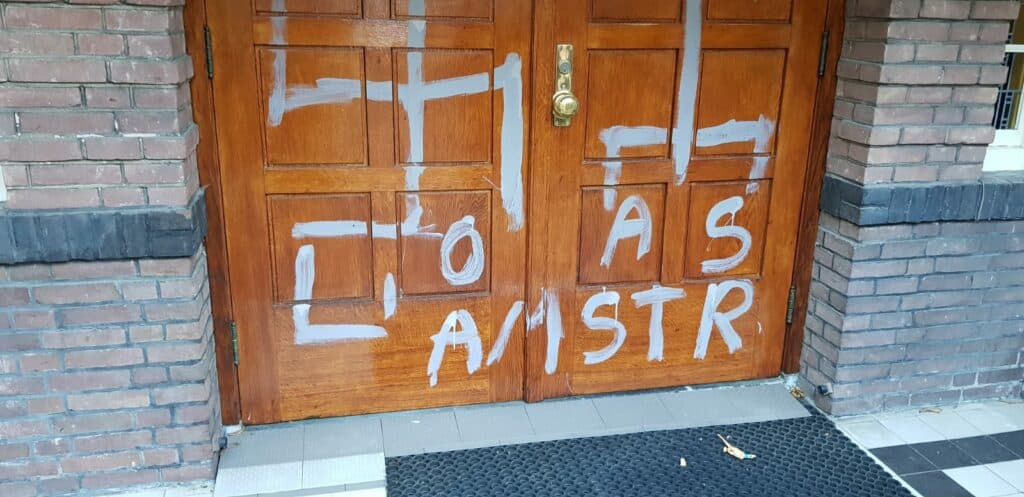“Alors que les institutions et les hommes politiques européens consacrent des ressources importantes et ne ménagent pas leurs efforts dans la lutte contre l’antisémitisme, la situation ne s’améliore pas en Europe. Pire, elle se détériore”, a déclaré Joël Mergui, président du Consistoire central israélite de France, alors qu’il s’adressait mardi à une conférence de dirigeants juifs organisée à Bruxelles par l’Association juive européenne (EJA).
”Il est temps de regarder la réalité en face. La lutte contre l’antisémitisme ne peut se réduire à l’isolement et à la pénalisation des actes antisémites. Cette pénalisation est bien sûr essentielle. Les auteurs d’actes antisémites ne doivent jamais rester impunis. Mais pour être réellement efficace, la lutte contre l’antisémitisme doit s’attaquer à la racine du problème”, a-t-il ajouté.
Selon M. Mergui, l’Europe doit lancer des initiatives concrètes dans le domaine de l’éducation pour combattre les stéréotypes anti-juifs. ”Elle doit également valoriser l’héritage et la contribution du judaïsme et rappeler sans cesse que la spiritualité juive fait partie intégrante de la culture européenne.”
Ses remarques sont intervenues alors qu’une nouvelle enquête exhaustive sur les préjugés antisémites dans 16 pays européens a été dévoilée avant la conférence. Les résultats de l’enquête semblent plutôt inquiétants.
La Ligue d’action et de protection (AP) – partenaire de l’EJA – a commandé l’enquête avec IPSOS SA, sous la direction du professeur András Kovács de l’Université d’Europe centrale de Vienne-Budapest, en prenant 16 pays européens et en posant des questions directes aux répondants, et en assurant un suivi lorsque cela semblait nécessaire. Les pays interrogés sont l’Autriche, la Belgique, la République tchèque, la France, l’Allemagne, la Grèce, la Hongrie, l’Italie, la Lettonie, les Pays-Bas, la Pologne, la Roumanie, la Slovaquie, l’Espagne, la Suède et le Royaume-Uni.
L’enquête montre que la Grèce, la Pologne et la Hongrie sont les pays européens où les préjugés antisémites sont les plus répandus. Mais malgré un niveau élevé d’attitudes anisémites, ces trois pays sont rarement témoins d’attaques violentes contre les Juifs, alors que les pays qui connaissent des attaques plus fréquentes contre les Juifs, en Europe occidentale, sont souvent ceux qui affichent les taux les plus bas de préjugés antisémites.
Parmi les chiffres inquiétants, citons :
Près d’un tiers des personnes interrogées en Autriche, en Hongrie et en Pologne ont déclaré que les Juifs ne seront jamais en mesure de s’intégrer pleinement dans la société.
Près d’un tiers sont d’accord pour dire qu’il existe un réseau juif secret qui influence les affaires politiques et économiques dans le monde. (Roumanie – 29% ; France – 28% ; République tchèque – 23% ).
En Espagne, 35% des personnes interrogées ont déclaré que les Israéliens se comportent comme des nazis à l’égard des Palestiniens ; 29% ont dit la même chose aux Pays-Bas ; et 26% étaient d’accord avec cette affirmation en Suède.
En Lettonie, un peu plus d’un tiers – 34% – a déclaré que les Juifs exploitent la victimisation de l’Holocauste à leurs propres fins ; 23% étaient d’accord en Allemagne ; et 22% en Belgique.
Un quart de toutes les personnes interrogées sont d’accord avec l’affirmation selon laquelle les politiques d’Israël leur font comprendre pourquoi certaines personnes détestent les Juifs.
“Les Juifs d’Europe doivent proposer des plans d’action spécifiques à leurs gouvernements ainsi qu’au niveau européen”, a déclaré le rabbin Shlomo Koves, fondateur de l’APL et initiateur de l’enquête. “Nous devons prendre notre destin en main si nous voulons que nos petits-enfants puissent vivre en Europe dans 20 à 50 ans”, a-t-il ajouté.
La conférence de Bruxelles, qui durera deux jours, réunira des dizaines de dirigeants, de parlementaires et de diplomates juifs européens de premier plan, dont Margaritis Schinas, vice-présidente de la Commission européenne, ainsi que le président d’Israël Isaac Herzog et le ministre des affaires de la diaspora Nachman Shai, qui s’adresseront à l’assemblée depuis Jérusalem.
La Commission européenne a présenté la semaine dernière la toute première stratégie européenne de lutte contre l’antisémitisme et de promotion de la vie juive.
Face à la montée inquiétante de l’antisémitisme, en Europe et au-delà, la stratégie vise à définir une série de mesures articulées autour de trois piliers : prévenir toutes les formes d’antisémitisme, protéger et encourager la vie juive et promouvoir la recherche, l’éducation et la mémoire de l’Holocauste.
“Alors que nous félicitons les institutions européennes d’avoir augmenté les ressources, l’expertise et les fonds importants pour lutter contre l’antisémitisme, nous sommes actuellement bien en retard dans la lutte contre sa propagation, comme le montrent les résultats inquiétants de l’enquête de nos partenaires. Notre plan pour relancer ce processus implique l’adoption de nos ‘dix commandements’ pour combattre l’antisémitisme, qui seront portés par des groupes de travail parlementaires de toute l’Europe”, a déclaré le leader de l’Association juive européenne, le rabbin Menachem Margolin.
Dans ses remarques, Joel Mergui a déclaré que l’Europe doit également s’engager à préserver la liberté de conscience et de culte. “Elle doit condamner les lois punitives sur les anciennes pratiques religieuses de l’abattage rituel et de la circoncision”, a-t-il dit en référence à l’interdiction en Belgique de la shechita, l’abattage casher juif.
”Ces libertés sont les garants de la pérennité du judaïsme sur le continent. Elles ne sont pas négociables. Les Juifs sont un baromètre de la liberté : s’ils peuvent vivre pleinement leur identité juive, tout le monde le peut aussi”, a déclaré M. Mergui.
”La liberté de religion des juifs est un baromètre de la liberté, si les juifs peuvent vivre pleinement leur identité, tout le monde le peut aussi”, a-t-il conclu.
La France compte la plus grande communauté juive d’Europe.
https://fr.ejpress.org/joel-mergui-malgre-les-efforts-de-lue-pour-lutter-contre-lantisemitisme-la-situation-ne-sameliore-pas-en-europe-pire-elle-se-deteriore/amp/















